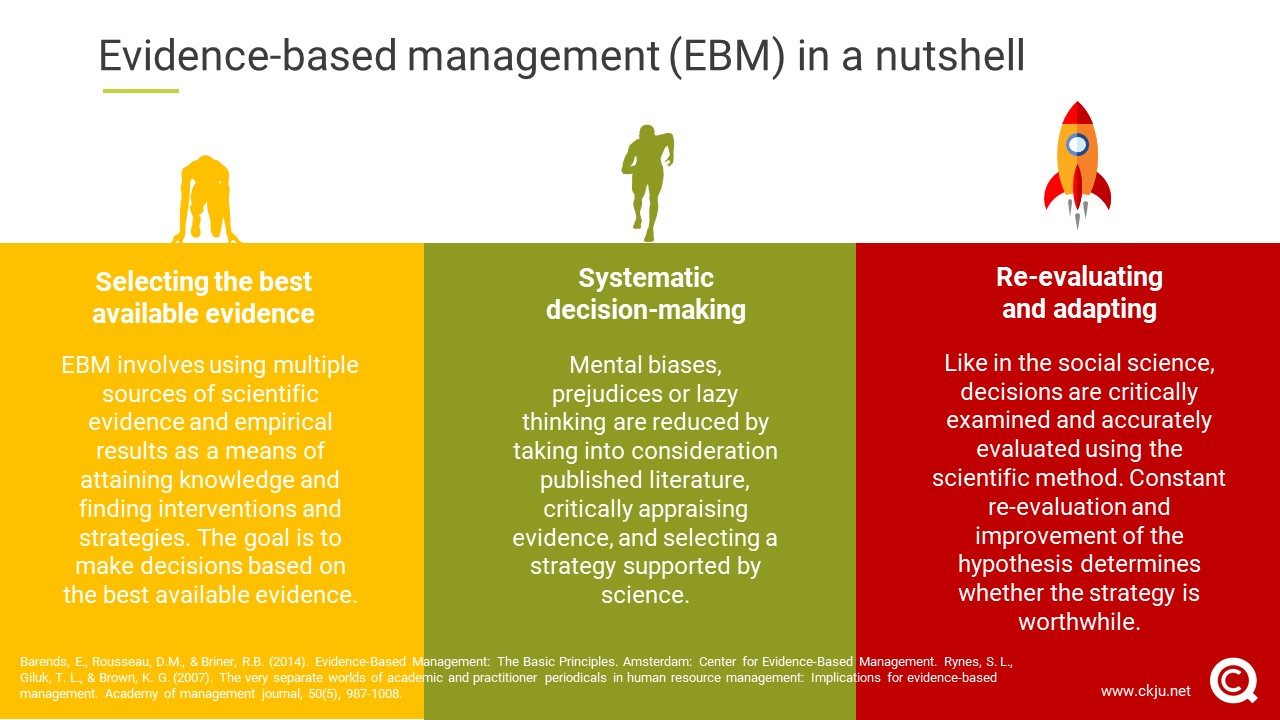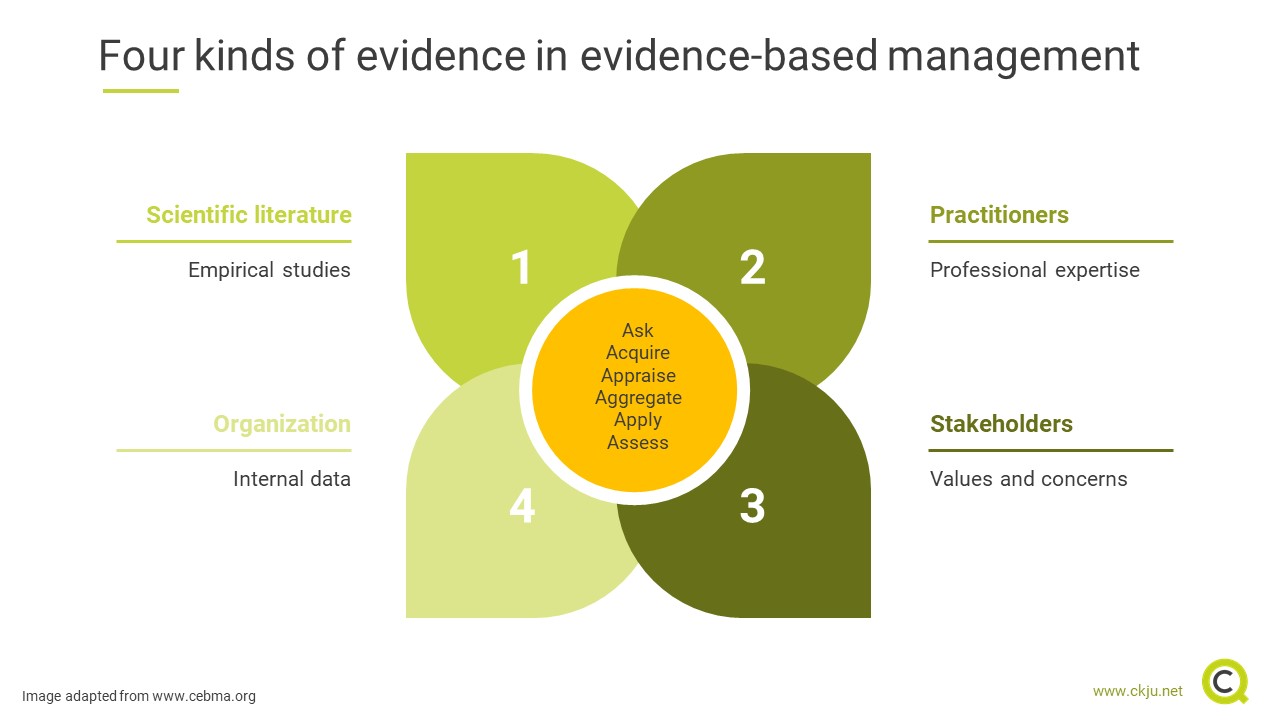- Blog
- Evidence-based management
Contents
- A growing number of managers and professionals draw on scientific research
- Evidence-based management reduces errors in judgement
- Evidence-based management is driven by science and data
- Evidence-based management increases accountability
- Common mistakes when taking an evidence-based management approach
- CQ Dossiers provide reviews and distillations on a variety of evidence-based management topics
- References and further reading
A growing number of managers and professionals draw on scientific research
Evidence-based management takes its inspiration from evidence-based medicine, an approach that relies on experimental, carefully tested approaches to treating illness. Just as there is a massive and ever-growing body of knowledge on how to treat and prevent disease, there is also a voluminous, ever-growing knowledge base from the social sciences regarding how to manage individuals and run organizations effectively.
While many managers still make decisions based on instinct, personal experience, or industry-wide trends (Rynes, Colbert, & Brown, 2002), a growing number of educated, scientifically-minded professionals opt instead to use the academic literature to determine “best practices” and select options that have been demonstrated to succeed in numerous studies.
There are myriad benefits to taking an evidence-based approach to managing individuals within an organization. There are challenges and barriers to taking this approach, too – most notably, for some managers and professionals, a lack of familiarity and comfort with scientific journals and academic writing. This blog post will review some of the greatest benefits to taking an evidence-based management approach, and outline some solutions to common reservations that managers have about adopting this approach.
Management skills newsletter
Join our monthly newsletter to receive management tips, tricks and insights directly into your inbox!
Evidence-based management reduces errors in judgement
Experienced professionals often rely on a finely-tuned sense of intuition; as a manager, your accumulated past experiences help inform your “gut feelings” today, often in useful ways (see Rew & Barrow, 2007, for a discussion of intuition as a decision-making guide). However, even an expert manager can make snap judgements tainted by mental biases, latent prejudices, or even lazy thinking (Sanders, van Riemsdijk, & Groen, 2008). While all people have momentary lapses in judgement, psychological research on the subject reveals that most people cannot recognize when their judgement is biased (Koch, D’Mello, & Sackett, 2015).
An evidence-based approach to management reduces the potential for irrational thinking, bias, or exhaustion to negatively impact management decisions. Rather than selecting an intervention or strategy based on gut feelings, personal experiences, or popular trends in the industry, an evidence-based manager reviews the published literature on the subject, critically appraises the quality of the evidence, and selects a strategy that is supported by science (Rynes, Giluk, & Brown, 2007).
This method of decision-making is systematic, and requires that a manager familiarize themselves with the work of dozens, even hundreds, of other cases studied in the literature. By relying on the aggregated results of many others, an evidence-based manager is able to “zoom out” of their own circumstances, and see more clearly the factors that ought to impact their decision-making. This can slow down the decision-making process in some instances, but it increases objectivity and clarity of thought.
Evidence-based management is driven by science and data
After a manager introduces a new strategy within their organization, it can be immensely difficult to determine whether the strategy was effective in objective terms. Any observed changes within the organization may be due to the new strategy, or due to extraneous factor such as personnel changes, shifting market forces, sociopolitical events, or even changes in the weather.
Human behavior is notoriously tricky to explain or predict, and it is influenced by numerous variables at all times. Furthermore, a manager may not be able to interpret the effects of their decisions objectively (Tschan et al, 2009); there may be a strong temptation to see an intervention as more effective than it actually is, or to “cherry pick” signs that a strategy was effective, in spite of any evidence suggesting otherwise.
An evidence-based management approach, in contrast, relies on the scientific method to fairly examine interventions and accurately evaluate their performance. Social science research is guided by firm principles regarding how to prove cause and effect relationships. After an intervention has been instituted, statistical methods are used to document improvements and determine whether a strategy is worthwhile in simple mathematic terms. Conclusions can be easily drawn, interpreted, and conveyed to stakeholders in a non-biased manner as a result.
Evidence-based management increases accountability
As a manager and professional, decision-making is your daily business. Making the right or wrong decision has an immediate impact on organizational performance. It is your responsibility to make sure your decision-making process adheres to the highest quality standards available. This is not just important for you as an individual, but for the organization, department, project, or team you are responsible for. It is the quality of your decision-making process that impacts their future.
Taking an evidence-based management approach makes sure you consider the best available evidence when taking decisions. More specifically, it points towards the following four sources of evidence:
- Organizational data
- Professional expertize
- Stakeholder values and concerns
- Insights from scientific research
All four sources of evidence are considered equally important. However, their quality and availability differs depending on the specific business challenge you are facing. Consequently, it is of critical importance to appraise the quality of the available evidence before using it in decision-making.
A decision-making process that relies on a structured and quality-oriented approach increases transparency and therefore accountability. As a result, you will not just increase organizational performance but also your standing, reputation, and career perspectives as a manager and professional.
Common mistakes when taking an evidence-based management approach
Many managers are aware that scientific research on management and organizational behavior exists. However, since relatively few managers have academic or scientific training, few feel empowered to access, search, and make productive use of that research. If a manager does choose to venture into the published literature, they may find that peer-reviewed journal articles are written in a jargon-filled, dry manner that is difficult or intimidating to read (de Bruin & Bostrom, 2013)
One of the first steps to becoming an evidence-based manager is to get over the “intimidation factor”, when it comes to searching and consuming published science. Scientific research is intended to serve the public interest, and is frequently made available to individuals outside of academia. Published, high-quality research can be found in databases such as JSTOR and PsychInfo, and via academic search engines like Google Scholar. Journals devoted to organizational research, such as SAGE’s Journal of Management, can also be searched for empirical work relevant to a manager’s needs and interests.
Reading and interpreting scientific research is daunting; however, most sections of a standard journal article can be read and understood without any statistical or higher-level scientific training. This guide to reading scientific literature can help you familiarize yourself with how a peer-reviewed article is written, and how to go about locating needed information within one. Learning a few basic statistical concepts can also help empower a manager to consume research productively – this guide reviews basic statistics in an approachable way, without any mathematics.
CQ Dossiers provide reviews and distillations on a variety of evidence-based management topics
Beyond reading individual articles, there are several other ways for a manager to remain up-to-date on the latest findings in management research. Reviewing a management journal’s current publications and reading the abstracts of each new article can provide a high-quality overview of the scientific work currently being done on the subject.
A literature review article or research chapter can be a productive and informative way of brushing up on the current state of science on a specific topic or sub-area. Finally, research dossiers offered by CQ Net - Management skills for everyone! provide carefully curated reviews and distillations of the scientific literature, on a variety of evidence-based management topics. These dossiers are written with the needs and skill base of evidence-based managers in mind.
References and further reading
Barends, E., Rousseau, D.M., & Briner, R.B. (2014). Evidence-Based Management: The Basic Principles. Amsterdam: Center for Evidence-Based Management.
de Bruin, W. B., & Bostrom, A. (2013). Assessing what to address in science communication. Proceedings of the National Academy of Sciences, 110(Supplement 3), 14062-14068.
Koch, A. J., D’Mello, S. D., & Sackett, P. R. (2015). A meta-analysis of gender stereotypes and bias in experimental simulations of employment decision making. Journal of Applied Psychology, 100(1), 128.
Rew, L., & Barrow Jr, E. M. (2007). State of the science: intuition in nursing, a generation of studying the phenomenon. Advances in Nursing Science, 30(1), E15-E25.
Rynes, S.L., Colbert, A.E., Brown, K.G. (2002). HR Professionals' beliefs about effective human resource practices: correspondence between research and practice. Human Resource Management, 41 (2), 149-174
Rynes, S. L., Giluk, T. L., & Brown, K. G. (2007). The very separate worlds of academic and practitioner periodicals in human resource management: Implications for evidence-based management. Academy of management journal, 50(5), 987-1008.
Sanders, K., van Riemsdijk, M., & Groen, B. (2008). The gap between research and practice: a replication study on the HR professionals’ beliefs about effective human resource practices. The International Journal of Human Resource Management, 19(10), 1976-1988.
Tschan, F., Semmer, N. K., Gurtner, A., Bizzari, L., Spychiger, M., Breuer, M., & Marsch, S. U. (2009). Explicit reasoning, confirmation bias, and illusory transactive memory: A simulation study of group medical decision making. Small Group Research, 40(3), 271-300.
Top Rated
About the Author

Comments
Most Read Articles
Blog Categories
RELATED SERVICES











Add comment